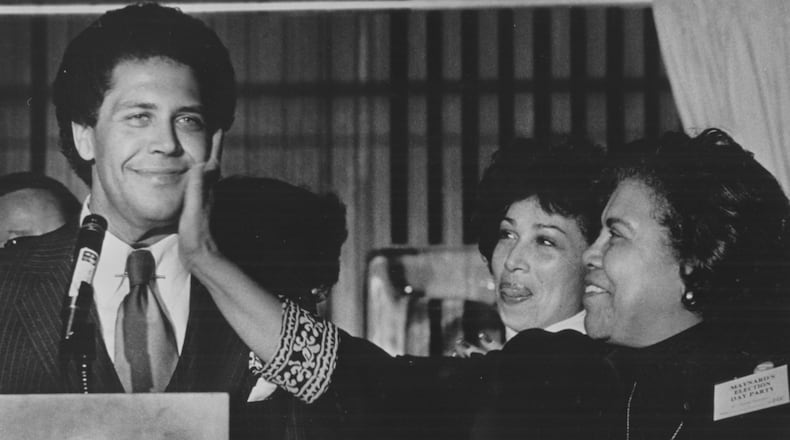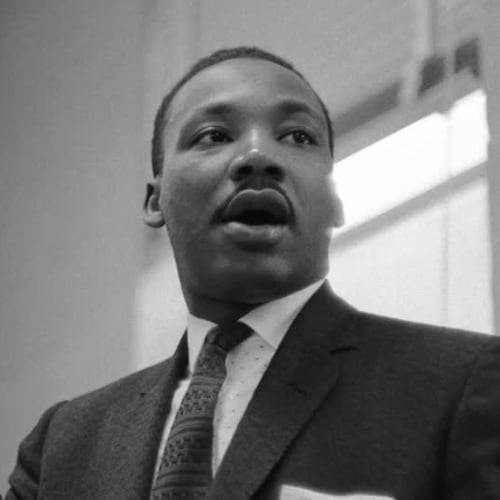Editor’s Note: This story is one in a series of Black History Month stories that explores the role of resistance to oppression in the Black community.
The late Atlanta Mayor Maynard Jackson Jr. noticed in 1975 that white architectural and engineering firms held airport contracts for more than a decade without rebids. He soon announced renegotiations for long-standing contracts, and the backlash came from all sides.
Atlanta was in the middle of a historic $500 million airport expansion established by previous administrations. But Jackson threatened to delay the airport’s designing, planning and construction unless minorities got involved.
“It’s a question of doing what’s right and not pussyfooting around,” said Jackson, according to his biography by retired state Rep. Robert Holmes. “I’m sick and tired of hypocrisy.”
Credit: Hyosub Shin / hshin@ajc.com
Credit: Hyosub Shin / hshin@ajc.com
Officials from the administrations of four different Atlanta mayors told The Atlanta Journal-Constitution Jackson had support from his cabinet and key federal allies. Jackson knew there would be resistance because whites historically had more than 99% of the city contracts, Holmes wrote. Jackson nonetheless delayed the project’s start date in June 1975.
“Some of those contractors had been at work for years on the project,” said Marva Brooks, Jackson’s city attorney. “He basically issued a cease work order. He would not pay them for anything they were doing.”
Breaking barriers
Credit: AJC Photo Archives
Credit: AJC Photo Archives
Jackson’s actions were bold at the time, as the federal government’s push for more diversity had just begun. The first time Blacks and whites came together in an Atlanta hotel ballroom was when Coca-Cola’s executives organized a 1964 Nobel Peace Prize banquet for Martin Luther King Jr., said Brooks.
A decade later, the first Black mayor of an American Southern city told the world Atlanta’s funds would be shared with qualified minorities.
“There was a reluctance to accept there would be Black and female and Latinos, and others who could actually either hold the top jobs in the city, or who could do the contract work,” said Franklin. She became Jackson’s cultural affairs commissioner in 1978 before she became the first Black female mayor of a major Southern city in 2002.
Emma Darnell, Jackson’s administrative services commissioner, revealed Atlanta purchased more than $33 million in goods and services in 1973, according to Jackson’s biography. Minorities received $56,710 from those purchases. She told the Chicago Sun-Times in 1975 that “88% of all (city) jobs above $10,000 are held by white males.”
Bill Swift, Jackson’s purchasing director, said minorities had less than 1% of Atlanta’s contracts. Clara Axam, Jackson’s human resources administrator, said Black city employees were 57% of their unskilled labor workforce.
Jackson’s administration created a prequalification process for businesses to show how minorities would participate in 15% of the project before the company could bid on the work. The policy later included female-owned businesses. It was codified by an ordinance based on the federal Equal Employment Opportunity law.
Credit: Larry Rubenstein
Credit: Larry Rubenstein
Atlanta’s white companies hired minorities, but Jackson wanted to see joint ventures with Black-owned companies — biracial partnerships where businesses would cash their funds from city projects as co-owners instead of employees and employers.
The feds questioned the legality of the initiative from day one, said Brooks and Swift. Former Metro Atlanta Chamber Chief Executive Sam Williams said the state government and political leaders outside of the city did not support Jackson.
“The state has since then, on several occasions, tried to take over the airport and make it a part of the state government,” said Williams. He said the airport takeover has never received full support from the Georgia General Assembly. Georgia also can’t take over federally financed facilities.
Swift said downtown Atlanta’s power structure resisted inclusion because “it didn’t fit with what was normal.” Some local contractors wanted to sue Atlanta because they didn’t qualify for city work, Brooks said. Jackson also faced biracial resistance from Atlanta City Council, who was still accustomed to having executive power. Atlanta’s mayor obtained more power from the 1974 city charter amendment.
“In every kind of contract, you could imagine there was resistance,” Brooks said. “We stayed in court fighting and relitigating appeals for years in court to satisfy some people that we had the proper legal foundations and authority.”
The world’s busiest airport
Credit: Kelly Wilkinson
Credit: Kelly Wilkinson
By October 1975, the airport’s expansion resumed. By 1980, the world’s largest passenger terminal opened. An AJC article from the time reported minority companies participated in 25% to 30% of the work.
Cities nationwide went on to mirror Atlanta’s actions. The feds partnered with Atlanta to model its programs after the city.
“You don’t want all the white folks being rich and all the Black folks being poor. That’s a scene for a revolution of some sort,” said Andrew Young, a former congressman, Atlanta mayor and United Nations ambassador. “We’re bigger than every airport in the United States. You don’t need to say it, but it just happens that it has all been done by the Black mayors and we haven’t raised taxes to do it.”
Oscar Harris said his architecture career positively skyrocketed after he secured work on Atlanta’s airport atrium through Jackson’s program.
And H. J. Russell & Company President Jerome Russell — whose father’s company blossomed due to Jackson — said an unprecedented group of multimillion dollar Black-owned businesses were created thanks to Hartsfield-Jackson International Airport during Atlanta’s 50 years of Black leadership.
“It was the creation of a new culture and a new reality for our city,” said Axam. “For his sheer unwillingness to accept the status quo, Jackson transformed how the city operates and how the city could see itself.”
This year, the AJC’s Black History Month series will focus on the role of resistance to forms of oppression in the Black community. In addition to the traditional stories that we do on African American pioneers, these pieces will run in our Living and A sections every day this month. You can also go to ajc.com/black-history-month for more subscriber exclusives on the African American people, places and organizations that have changed the world.
About the Author
The Latest
Featured







